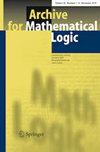Equivalence of generics
IF 0.3
4区 数学
Q1 Arts and Humanities
引用次数: 0
Abstract
Given a countable transitive model of set theory and a partial order contained in it, there is a natural countable Borel equivalence relation on generic filters over the model; two are equivalent if they yield the same generic extension. We examine the complexity of this equivalence relation for various partial orders, focusing on Cohen and random forcing. We prove, among other results, that the former is an increasing union of countably many hyperfinite Borel equivalence relations, and hence is amenable, while the latter is neither amenable nor treeable.
泛型的等价性
给定集合论的可数传递模型及其包含的偏序,在该模型上的一般滤波器上存在一个自然可数Borel等价关系;如果它们产生相同的泛型扩展,则它们是等效的。我们研究了各种偏阶的这种等价关系的复杂性,重点是科恩和随机强迫。我们证明了前者是可数多个超有限Borel等价关系的递增并,因此是可服从的,而后者既不可服从也不可树。
本文章由计算机程序翻译,如有差异,请以英文原文为准。
求助全文
约1分钟内获得全文
求助全文
来源期刊

Archive for Mathematical Logic
MATHEMATICS-LOGIC
CiteScore
0.80
自引率
0.00%
发文量
45
审稿时长
6-12 weeks
期刊介绍:
The journal publishes research papers and occasionally surveys or expositions on mathematical logic. Contributions are also welcomed from other related areas, such as theoretical computer science or philosophy, as long as the methods of mathematical logic play a significant role. The journal therefore addresses logicians and mathematicians, computer scientists, and philosophers who are interested in the applications of mathematical logic in their own field, as well as its interactions with other areas of research.
 求助内容:
求助内容: 应助结果提醒方式:
应助结果提醒方式:


